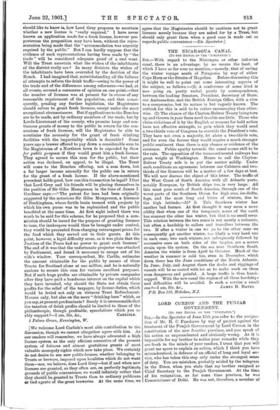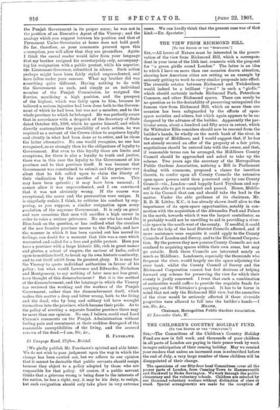LORD CURZON AND THE PUNJAB GOVERNMENT.
[TO TOE EDITOR OP THE "SPECTATOR:]
Sm,—In the Spectator of June 15th you refer to the resigna- tion of Mr. H. C. Fanshawe by way of protest against the treatment of the Punjab Government by Lord Curzon in the constitution of the new frontier province, and you speak of his action as unprecedented and obviously wrong. As it is impossible for my brother to notice your remarks while they are fresh in the minds of your readers, I trust that you will grant me space to explain an action, which I think you have misunderstood, in defence of An_ official of long and loyal ser- vice, who has taken this step only under the strongest sense of duty. You are mistaken, probably misled by the telegram in the Times, when you state that my brother resigned as Chief Secretary to the Punjab Government. At the time of his resignation, as for some time previous, he W1L9 Commissioner of Delhi. He was not, therefore, a =raker of the Punjab Government in its proper sense; he was not in the position of an Executive Agent of the Viceroy; and the analogy which you suggest between his position and that of POrmanent Under-Secretaries at home does not hold good. Se far, therefore, as your comments proceed upon this assumption, you will allow that they are groundless. Again, I think the casual reader would infer from your language that my brother resigned his secretaryship only, accompany- ing his resignation with a public protest, while his superior, tke Lieutenant-Governor, submitted in silence. Such action perhaps might have been fairly, styled unprecedented, and have fallen under your censure. What my brother did was something quite different. Having nothing to do with the Government as such, and simply as an individual member of the Punjab Commission, he resigned the Service, sacrificing a high position, and the prospect of the highest, which was fairly open to him, because he believed a serious injustice had been done both to the Govern- ment of which he had been but was not a member, and to the whole province to which he belonged. He was perfectly aware that in accordance with a despatch of the Secretary of State dated October 6th, 1898, which he quotes himself, and which directly contemplates the possibility of such action, he was required as a servant of the Crown either to acquiesce loyally and silently in what had been done or to retire, and he chose the latter alternative. No one would recognise, no one has recognised, more strongly than he the obligations of loyalty to Government. But even to this loyalty there are limits and exceptions, for there is also a loyalty to truth and justice, there was in this case the loyalty to the Government of his province and to that province itself. It was because that Government was constrained to submit and the province was silent that he felt called upon to claim the liberty of their vindication by the sacrifice of his service. This may have been quixotic ; it may have been unusual; I cannot allow it was unprecedented, and I am convinced that it was not obviously wrong. If the course was exceptional, the cause and the provocation were unique. It is singularly unfair, I think, to criticise his conduct by sup- posing, as you suppose, a similar resignation upon every resolution of the supreme Government. It is only on great and rare occasions that men will sacrifice a high career in order to voice a serious grievance. No one who has read the Blue-book on the question, or has realised what the creation of the new frontier province means to the Punjab, and how the manner in which it has been carried out has moved its feelings, can doubt for a moment that this was a case which warranted and called for a free and public protest. Here you have a province with a large historic life, rich in great names and glories, a school of empire, the saviour of India, called upon to mutilate itself, to break up its own historic continuity, and to cut itself adrift from its greatest glory. It is easy for the Viceroy to quote individual authorities in favour of his policy ; but what would Lawrence and Edwardes, Nicholson and Montgomery, to say nothing of later men not less great, have thought of this dismemberment ? But it is the method of the dismemberment, and the language in which the Viceroy has reviewed the working and the workers of the Punjab Government, rather than the dismemberment itself, which makes this matter a deep and bitter wrong, both to the living and the dead, who by long and solitary toil have wrought
themselves into the province, which became their pride. As to the policy of erecting a separate frontier province there may be more than one opinion. No one, I believe, could read Lord Curzon's comments on the Punjab Administration without feeling pain and resentment at their reckless disregard of the reasonable susceptibilities of the living, and the assured renown of the dead.—I am, Sir, &c.,
53 Canynge Road, Clifton, Bristol. R. FANSHAWE.
[We gladly publish Mr. Fanshawe's spirited and able letter. We do not wish to pass judgment upon the way in which the change has been carried out, but we adhere to our opinion that it cannot be desirable that public servants should resign because they object to a policy adopted by those who are responsible for that policy. Of course, if a public servant thinks that a grievous wrong is being done to the interests of the nation, he has a right, nay, it may be his duty, to resign, but such resignation should only take place in very extreme
cases. We can hardly think that the present case was of that kind.—En. Spectator.]











































 Previous page
Previous page